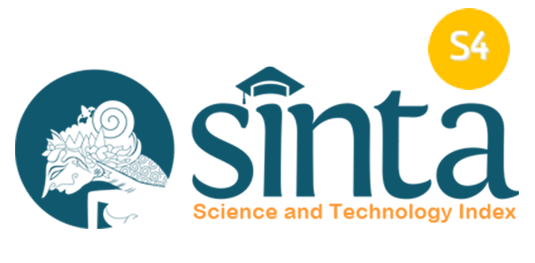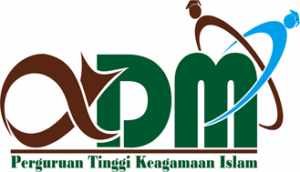Senior high school students’ argumentation in proving mathematical induction based on mathematical abilities
Abstract
Argumentation and proof are two interrelated elements in mathematics, which is one of the important goals in mathematics education. Furthermore, these also need to be supported by students' mathematical abilities, so that it has implications for proving they did. This qualitative research will be explained descriptively which aims to find out senior high school students' argumentation in proving mathematical induction. This research subjects consisted of six senior high school students in Surabaya who had low, medium, and high mathematical abilities. Research data were collected through a written test about proving mathematical induction. Then, the data analysis will be carried out, including: sorting the data, presenting the data, and making conclusions. The results shows that senior high school students who have medium and high mathematical abilities can proving mathematical induction which bring up claims, evidence, and reasoning in their argumentation. Meanwhile, senior high school students who have low mathematical abilities can proving mathematical induction which only bring up claims and evidence in their argumentation.
Keywords
Full Text:
PDFReferences
Aberdein, A. (2009). Mathematics and argumentation. Foundations of Science, 14(1–2), 1. https://doi.org/https://doi.org/10.1007/s10699-008-9158-3
Brown, R. (2017). Using collective argumentation to engage students in a primary mathematics classroom. Mathematics Education Research Journal, 29(2), 183–199. https://doi.org/10.1007/s13394-017-0198-2
CadwalladerOlsker, T. (2011). What do we mean by mathematical proof? Journal of Humanistic Mathematics, 1(1), 33–60. https://doi.org/10.5642/jhummath.201101.04
Cervantes-Barraza, J. A., Hernandez Moreno, A., & Rumsey, C. (2020). Promoting mathematical proof from collective argumentation in primary school. School Science and Mathematics, 120(1), 4–14. https://doi.org/10.1111/ssm.12379
Firmasari, S., & Sulaiman, H. (2019). Kemampuan pembuktian matematis mahasiswa menggunakan induksi matematika. Journal Of Medives: Journal Of Mathematics Education IKIP Veteran Semarang, 3(1), 1–9. https://doi.org/https://doi.org/10.31331/medivesveteran.v3i1.642
González-Howard, M., & McNeill, K. L. (2019). Teachers’ framing of argumentation goals: Working together to develop individual versus communal understanding. Journal of Research in Science Teaching, 56(6), 821–844. https://doi.org/10.1002/tea.21530
González-Howard, M., McNeill, K. L., Marco-Bujosa, L. M., & Proctor, C. P. (2017). ‘Does it answer the question or is it French fries?’: an exploration of language supports for scientific argumentation. International Journal of Science Education, 39(5), 528–547. https://doi.org/10.1080/09500693.2017.1294785
Hapipi, S. A., & Turmuzi, M. (2019). PROFIL ARGUMENTASI MAHASISWA DALAM MELAKUKAN PEMBUKTIAN PADA TOPIK ANALSISIS KOMPLEKS. Mandalika Mathematics and Educations Journal, 1(1), 41–52. https://doi.org/http://dx.doi.org/10.29303/jm.v1i1.1243
Hine, G. (2017). Proof by mathematical induction: Professional practice for secondary teachers. 26th Biennial Conference of the Australian Association of Mathematics Teachers, 1–8.
Karsenty, R. (2014). Mathematical Ability. In Encyclopedia of Mathematics Education. https://doi.org/10.1007/978-94-007-4978-8_94
Kartini, E. S. (2015). Analisa Kesulitan Pembuktian Matematis Mahasiswa pada Mata Kuliah Analisis Real. SEMIRATA 2015, 1(1), 189–199. https://jurnal.untan.ac.id/index.php/semirata2015/article/view/14066
Knudsen, J., Lara-meloy, T., Stevens, H. S., & Rutstein, D. W. (2014). Advice for mathematical argumentation. Mathematics Teaching in the Middle School. https://doi.org/https://doi.org/10.5951/mathteacmiddscho.19.8.0494
Laamena, C. (2017). Karakteristik Warrant dalam Argumentasi dan Pembuktian Matematis. Seminar Nasional Hasil Penelitian Universitas Kanjuruhan Malang, 296–302. https://semnas.unikama.ac.id/lppm/prosiding/2017/4.PENDIDIKAN/Christina_Penelitian_Pendidikan.pdf
McNeill, K. L. (2011). Elementary students’ views of explanation, argumentation, and evidence, and their abilities to construct arguments over the school year. Journal of Research in Science Teaching. https://doi.org/10.1002/tea.20430
McNeill, K. L., GonzÁlez-Howard, M., Katsh-Singer, R., & Loper, S. (2017). Moving Beyond Pseudoargumentation: Teachers’ Enactments of an Educative Science Curriculum Focused on Argumentation. Science Education. https://doi.org/10.1002/sce.21274
Mcneill, K. L., & Krajcik, J. (2008). Inquiry and Scientific Explanations: Helping Students Use Evidence and Reasoning. In J. Luft, R. Bell, & J. Gess-Newsome (Eds.), Science as inquiry in the secondary setting (pp. 121–134). Arlington, VA: National Science Teachers Association Press.
McNeill, K. L., & Krajcik, J. S. (2012). Supporting grade 5–8 students in constructing explanations in science: The claim, evidence and reasoning framework for talk and writing. New York, NY: Pearson Allyn & Bacon.
McNeill, K. L., & Martin, D. M. (2011). Claims, Evidence, and Reasoning: Demystifying Data During a Unit on Simple Machines. Science and Children, 48(8), 52–56. http://searkscience.pbworks.com/w/file/fetch/70117336/2-Claimsevidence.pdf
Michaelson, M. T. (2008). A literature review of pedagogical research on mathematical induction. Australian Senior Mathematics Journal, 22(2), 57–62. https://doi.org/https://search.informit.org/doi/10.3316/informit.410329014071111
Mikeska, J. N., & Howell, H. (2020). Simulations as practice-based spaces to support elementary teachers in learning how to facilitate argumentation-focused science discussions. Journal of Research in Science Teaching. https://doi.org/10.1002/tea.21659
Miles, M. B., Huberman, A. M., & Saldana, J. (2014). Qualitative Data Analysis: A Methods Sourcebook. Third Edition. In The SAGE Handbook of Applied Social Research Methods.
Nizoloman, O. N. (2013). Relationship between Mathematical Ability and Achievement in Mathematics among Female Secondary School Students in Bayelsa State Nigeria. Procedia - Social and Behavioral Sciences, 106. https://doi.org/10.1016/j.sbspro.2013.12.254
Pungkasari, A. M., Purwosetiyono, F. X. D., & Pramasdyahsari, A. S. (2020). Kemampuan Spasial Perception dalam Menyelesaikan Masalah Geometri berdasarkan Teori Van Hiele Ditinjau dari Kemampuan Matematika. Prismatika: Jurnal Pendidikan Dan Riset Matematika, 3(1), 75–86. https://doi.org/https://doi.org/10.33503/prismatika.v3i1.1123
Ruggiero, V. R. (2014). Becoming a critical thinker. USA: Cengage Learning.
Sugiyono. (2015). Sugiyono, Metode Penelitian dan Pengembangan Pendekatan Kualitatif, Kuantitatif, dan R&D , (Bandung: Alfabeta, 2015), 407 1. Metode Penelitian Dan Pengembangan Pendekatan Kualitatif, Kuantitatif, Dan R&D.
Suhendra, M. (2015). ARGUMENTASI MATEMATIK SEBAGAI SEBUAH KOMPETENSI MATEMATIK. Jurnal Pengajaran Matematika Dan Ilmu Pengetahuan Alam, 15(1). https://doi.org/10.18269/jpmipa.v15i1.284
Toulmin, S. E. (2003). The uses of argument: Updated edition. In The Uses of Argument: Updated Edition. https://doi.org/10.1017/CBO9780511840005
Walidah, N. Z., Kusaeri, K., & Yudi, U. (2019). Mengoptimalkan dukungan guru dalam melibatkan siswa menggunakan argumentasi kolektif pada pembelajaran matematika. MaPan, 7(2), 261–280. https://doi.org/10.24252/mapan.2019v7n2a7
Zambak, V. S., & Magiera, M. T. (2020). Supporting grades 1–8 pre-service teachers’ argumentation skills: constructing mathematical arguments in situations that facilitate analyzing cases. International Journal of Mathematical Education in Science and Technology, 51(8). https://doi.org/10.1080/0020739X.2020.1762938
DOI: https://doi.org/10.18860/ijtlm.v4i1.14315
Refbacks
- There are currently no refbacks.
Copyright (c) 2022 Natasya Ziana Walidah, Elly Susanti

This work is licensed under a Creative Commons Attribution-NonCommercial-ShareAlike 4.0 International License.
Indexed by :
.png)
.jpg)
.png)

.jpg)


